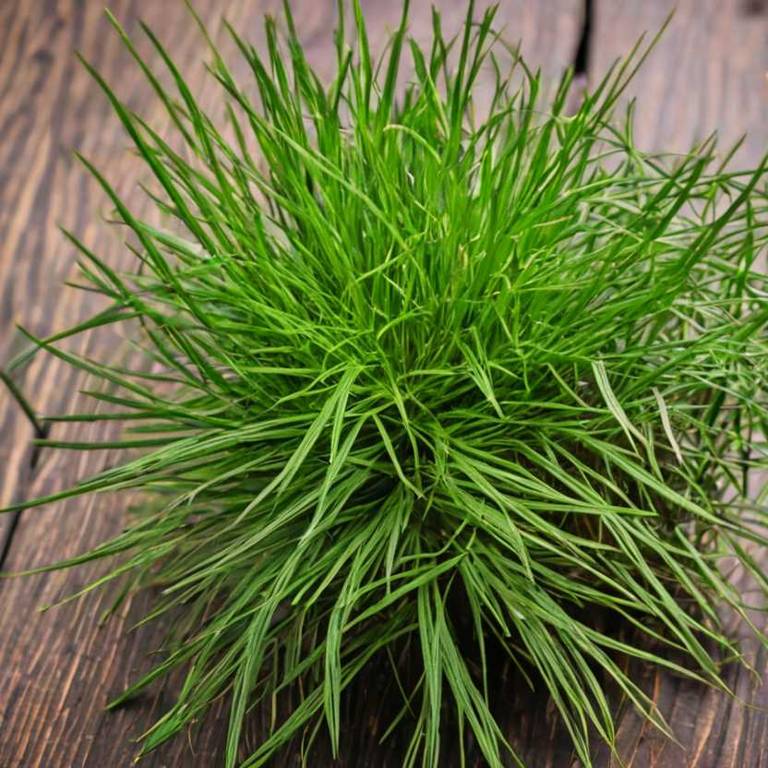By Leen Randell
Updated: Jul 10, 2024
What Are The Medicinal Properties Of Cyperus Scariosus (Rice Grass)?

Cyperus scariosus, also known as rice grass, has health benefits such as treating fever, cough, and respiratory issues.
Its medicinal constituents include flavonoids, alkaloids, and saponins that have anti-inflammatory, antiviral, and antimicrobial properties. Traditionally, it is prepared as a tea or infusion to treat various ailments, and its leaves are also used in poultices to reduce inflammation. However, excessive consumption may lead to stomach upset and allergic reactions.
When using Cyperus scariosus, it is essential to consult a healthcare professional to avoid potential interactions with medications.
This article explains the health benefits, active constituents, medicinal preparations, possible side effects, and precautions related to Cyperus scariosus.
What are the health benefits of Cyperus scariosus?
Cyperus scariosus, also known as rice grass, has health benefits such as anti-inflammatory and antioxidant properties.
It has been traditionally used to treat fever, digestive issues, and respiratory problems. The plant's extracts have also been shown to exhibit antimicrobial activity, making it a potential natural remedy for infections.
Additionally, Cyperus scariosus may help reduce blood sugar levels and lower cholesterol.
Here's a detailed article about the 10 health benefits of Cyperus scariosus.
What are the active constituents of Cyperus scariosus?
Cyperus scariosus, also known as rice grass, has active constituents such as flavonoids, alkaloids, and glycosides, which contribute to its medicinal properties.
These compounds possess anti-inflammatory, antimicrobial, and antioxidant activities. The presence of flavonoids, particularly quercetin and kaempferol, may help protect against oxidative stress and inflammation.
Alkaloids like cyperine are also present, which have been shown to exhibit antispasmodic and antitussive effects.
Here's a detailed article about the 10 active constituents of Cyperus scariosus.
What are the medicinal preparations of Cyperus scariosus?
Cyperus scariosus, also known as rice grass, has medicinal preparations such as infusion and decoction.
The infusion is made by steeping the plant material in hot water, while the decoction involves boiling it in water to extract its active compounds.
These preparations are traditionally used to treat various ailments, including fever, rheumatism, and skin conditions, and are said to possess anti-inflammatory and antibacterial properties.
Here's a detailed article about the 10 medicinal preparations of Cyperus scariosus.
What are the possible side effect of using Cyperus scariosus improperly?
Improper use of Cyperus scariosus, also known as rice grass, increases the chances of experiencing side effects such as gastrointestinal disturbances, diarrhea, and vomiting due to its high fibre and saponin content.
Prolonged consumption can also lead to allergic reactions, skin irritation, and respiratory issues.
In rare cases, excessive intake may cause kidney or liver damage, making it essential to use this herb with caution and under medical guidance.
Here's a detailed article about the 10 most common side effects of Cyperus scariosus.
What precautions to take when using Cyperus scariosus medicinally?
Before using Cyperus scariosus, also known as rice grass, for medicinal purposes, you must take precautions such as consulting with a qualified healthcare practitioner and identifying the plant accurately to avoid misidentification with toxic lookalikes.
Additionally, ensure proper dosing and preparation, as excessive consumption or improper handling can lead to adverse effects.
Pregnant or breastfeeding women should exercise caution and seek guidance from a medical professional.
Here's a detailed article about 10 precautions to take when using Cyperus scariosus.